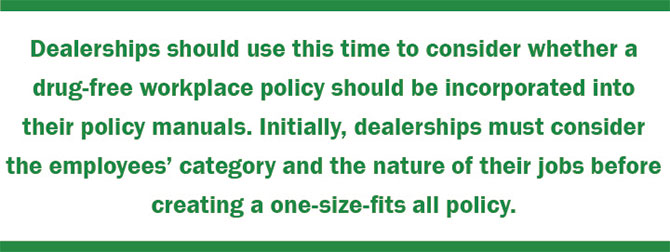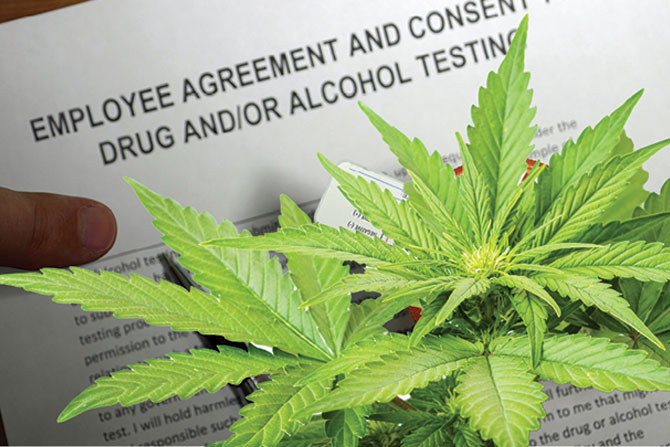By Jennifer Roselle, Esq. and Daniel Pierre, Esq.
On November 3, 2020, New Jersey voters overwhelming
chose to amend the New Jersey Constitution to legalize the recreational use of cannabis by adults age 21 and older. On December 17, 2020, the State Legislature passed the proposed enabling and regulatory bill which, as of this writing, awaits Governor Murphy’s signature. While many are excited by this upcoming change, dealerships are rightfully concerned with how recreational cannabis use will affect the workplace, such as safety and productivity.
Legal Status of Cannabis
Although cannabis is still classified as a Schedule I drug in the federal Controlled Substance Act, New Jersey joins a growing number of states that have legalized the use of cannabis for recreational or medicinal purposes. Currently, 15 states and the District of Columbia have legalized the recreational use of cannabis, and 35 states have legalized its use for medical purposes. While the U.S. House of Representatives recently approved legislation to remove cannabis from the Controlled Substance Act’s list, this bill is not expected to pass in the Republican-led senate.
New Jersey’s adoption of a Constitutional amendment did not immediately allow adult recreational use of cannabis. However, the State Legislature’s enactment of the New Jersey Cannabis Regulatory, Enforcement Assistance, and Marketplace Modernization Act legalizes the recreational use of cannabis by adults and directly affects New Jersey dealership’s drug-free workplace policies and drug testing procedures. The effective date varies according to the act’s provisions.
The new law prohibits dealerships from taking an adverse employment action solely because the employee chooses to use cannabis products. However, this does not mean a dealership is prohibited from enforcing a drug-free workplace policy or mandating, under some situations, applicant and employee drug testing. The law likewise does not require a dealership to allow workplace use or possession of cannabis.
Updating Employment Policies
Dealerships should use this time to consider whether a drug-free workplace policy should be incorporated into their policy manuals. Initially, dealerships must consider the employees’ category and the nature of their jobs before creating a one-size-fits-all policy. The New Jersey bill does not include express exceptions for safety-sensitive positions, so any policy must reconcile any appliable federal drug-free workplace requirements and the protected activity permitted by the New Jersey law. Even if federal drug-free workplace requirements do not apply, a dealership should draft or update its policies to clarify its expectations regarding cannabis usage so that employees are on notice about the requirements and the consequences for noncompliance.

Employee Drug Testing
The law gives dealerships discretion to conduct employee drug tests under certain circumstances. For example, the bill expressly allows drug testing based on a reasonable suspicion that an employee is under the influence of cannabis on the job. The act’s wording means dealerships must consider drug testing methodology as part of a drug testing policy. At a minimum, the bill requires a test that produces scientifically reliable results, which suggests using methods such as a urinalysis, blood sampling or saliva testing. These three methods detect prior use of cannabis but not necessarily current impairment. Given how slowly the human body metabolizes cannabis, an applicant or employee may test positive for cannabis even weeks after a single use and absent of any impairment signs. For this reason, new tests, such as cannabis breathalyzers and digital sobriety tests, are being developed to test current impairment. Dealerships with labor contracts may have to negotiate new employee testing procedures with the unions to avoid violating labor laws and the labor agreement.
The law also requires a physical examination of the individual as a condition of assessing impairment. The examination must be conducted by a qualified individual who meets the training mandates for a so-called Workplace Impairment Recognition Expert Certification. This individual will be certified after completing training on detecting or identifying use and impairment by cannabis or other intoxicating substances. By using this certification procedure, the bill aims to protect employees and applicants from adverse employment actions but still give dealerships flexibility not to hire an impaired applicant, or to discipline an impaired employee, under defined circumstances. Dealerships will need to identify one or more individuals to be trained for this purpose.
The requirements will be more fully defined and detailed by the regulations to be provided by the Cannabis Regulatory Commission at a later date. Although these provisions of the law will be effective immediately, they will not become operative until the Cannabis Regulator Commission issues its initial rules and regulations.
Medical Marijuana: The Wild Decision
Dealerships must also be mindful of their obligations to individuals with disabilities who use medical marijuana. Disciplining an employee solely for testing positive for cannabis may expose the employer to liability under the New Jersey Law Against Discrimination (NJLAD). A recent New Jersey Supreme Court case (Wild v. Carriage Funeral Holdings) illustrates what is at stake.
In Wild, a funeral director was terminated from his job after testing positive for cannabis. He filed an NJLAD claim alleging that his employer failed to accommodate his nonworkplace use of medical marijuana for his cancer treatment. The trial court initially dismissed the employee’s complaint, finding that an employer is not required to accommodate the medical use of cannabis in any workplace. The Appellate Division reversed the trial court’s decision and found the employee was not seeking a reasonable accommodation to use medical marijuana in the workplace but rather sought an accommodation to use his prescription medication away from his job. Accordingly, the Appellate Division concluded the employee’s NJLAD failure to accommodate the claim should proceed in court.
Then in 2020, the Supreme Court affirmed the Appellate Division’s decision and clarified two points. First, the court clarified there is no requirement to permit an employee to operate a vehicle or heavy machinery when the employee is under the influence of cannabis. Second, the court explained an employee’s use of medical marijuana is authorized by law, and therefore, may be protected under the NJLAD if used away from the workplace. The Wild case lesson is that, prior to disciplining an employee who tests positive for cannabis use, employers should first confirm whether the employee has a legitimate medical explanation for using cannabis.
Bottom Line
As the use of cannabis becomes more acceptable and more available throughout the United States, modernizing a workplace drug policy is something every New Jersey dealership should prioritize.
Jennifer Roselle, Esq. and Daniel Pierre, Esq.
For additional guidance on cannabis in the workplace, or for assistance in updating and revising your employee handbook and workplace drug policies, please contact Dina Mastellone, a partner in Genova Burns’ Human Resources Counseling and Compliance Practice Group at dmastellone@genovaburns.com, or Jennifer Roselle, Esq., counsel in the firm’s Cannabis, Labor, Human Resources Counseling and Compliance Practice Group at jroselle@genovaburns.com.
This story appears in Issue 4 2020-21 of the New Jersey Auto Retailer Magazine.







